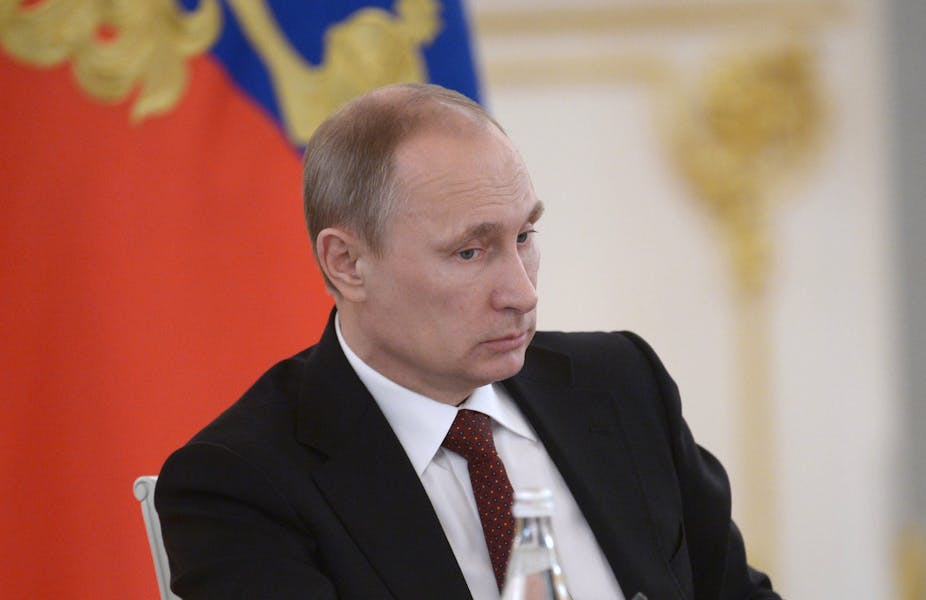The international community has been impotent since Russia responded to the November 2013 Ukraine crisis with force, culminating in annexation of the Ukrainian territory of Crimea this month.
The G7’s decision to boycott the G8 summit scheduled for June in Sochi indicates solidarity, but it is a largely symbolic move. Australia faces a similar opportunity to express opposition if it disinvites Russia from the G20 summit in November, although the larger number of group members makes a G20 response harder to co-ordinate than the G7.
What can Australia do? As a member of the global community, the government should join in condemnation of Russia’s behaviour, whatever Russia’s historical claims or the desire for self-determination among Crimean residents. The use of military power to impose a pseudo-referendum and takeover by local surrogates is unacceptable.
Given the limited links between the two countries, Australia has little to lose from joining internationally approved sanctions. But we also have little reason to expect that sanctions from Australia will have any impact.
The system of nations
Since the United Nations was established in 1945, the global system of nations has been based on the territorial integrity of members. The UN has been reluctant to respond to internal conflict other than by supplying peacekeepers, but has actively responded when a member’s territory has been forcibly annexed (as in Iraq’s invasion of Kuwait in 1990).
There have, of course, been exceptions. But never has one of the five permanent Security Council members expanded its national borders by force until Russia did so in 2014.
Russia has appeared decisive in its response to the Ukraine crisis because it does not recoil from using force, while the US and European Union rule out military involvement. Alone, Ukraine cannot hope to prevail in a military conflict with Russia, and is constrained to turn the other cheek unless its very existence is threatened. This has allowed Russia to play a game of chicken over its territorial aims.
Meanwhile, the global community struggles for a response. Censure in the UN will be vetoed by Russia. The move is useful only in exposing Russia’s isolation and pushing China to take a public position (so far, one of non-support for Russia).
What about sanctions?
The remaining options are economic and financial sanctions, but they have a poor track record. In the short term, sanctions may promote solidarity among the population of the target country. In the long run, sanctions may take a toll, but their impact is hard to isolate.
These effects were evident in high-profile sanctions cases against ostracised regimes in Rhodesia (now Zimbabwe) and South Africa. After unilaterally declaring independence in 1965, the illegal regime in Rhodesia ruled for 15 years. The apartheid regime in South Africa survived even longer after the introduction of sanctions in the 1960s.
In cases such as North Korea or Iran, sanctions may have put pressure on the regimes over several decades, but they have yet to convince the countries to fully abandon their nuclear weapon programs.
The Western response to Russia has been to personalise sanctions by identifying a few dozen targets and hitting them with asset bans and travel freezes. Australia is following this path, although unlike the US or EU, it declines to name the targets.
But assuming that top Russian policymakers are unlikely to place short-term travel or financial motives above high policy goals, and given the popularity of national expansion among the wider population, these measures seem more like irritants than serious policy responses.

A second obstacle to short-term success is the current strength of the Russian economy. After the post-1999 commodity boom, Russia’s foreign exchange reserves are high. Russia does not lack basic consumption goods or fuel.
The elite may be deprived of luxury imports, but they will grin and bear it, or import via neighbours such as Kazakhstan, which is in a customs union with Russia. Sanctions may work in the longer term given the underlying weaknesses of the Russian economy, but they will not quickly bring Russia to the negotiating table.
The third obstacle is that the costs of sanctions to the imposer are not equally shared. The US has been leading the push for sanctions, but it trades little with Russia and will benefit as a gas exporter if Russian supplies are boycotted. The EU is more reluctant because economic ties with Russia are stronger and the costs of trade disruption are greater.
The two largest EU trading partners with Russia, Germany and Italy, are the most reluctant sanctioners. The UK is lukewarm because financial sanctions will hurt London directly and undermine its reputation as a safe haven for all. France opposes restricting sanctions to military equipment as two Mistral helicopters are being built to order for Russia.
As a middle power, Australia’s obvious forum to express opposition is the G20. And as 2014 host, the government should take the lead in identifying a position that will be supported by an overwhelming G20 majority.
The G20 has greater legitimacy than the rich country clubs of the G7 or OECD in stigmatising Russia as an international pariah until it renounces the use of force to challenge a UN member’s territorial integrity.

